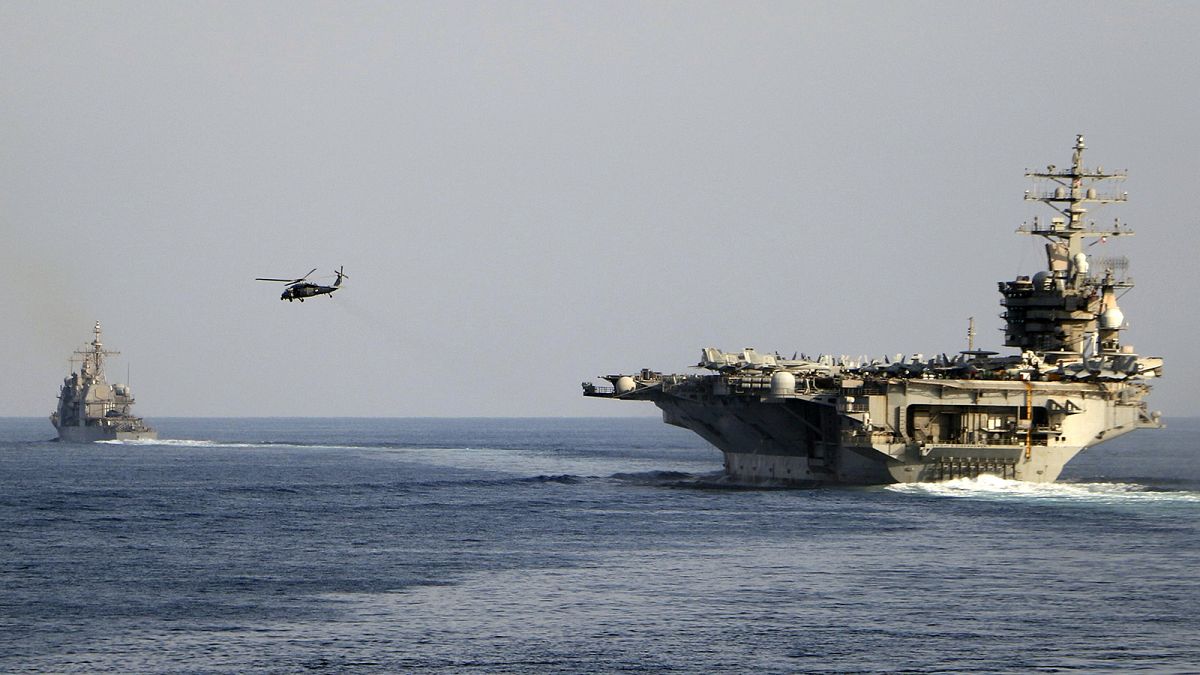An information war online between the US Navy and Houthi rebels has put the USS Dwight D Eisenhower’s existence into question over the past few months. Its commanding officer, Captain Christopher “Chowdah” Hill, is more alive than ever on social media.
The Houthis say it has been sunk several times in the past months. Its captain says they are eating cookies and tacos. So, what really happened to the USS Dwight D Eisenhower?
The truth is, one of the oldest ships in the US Navy is still up and running, or afloat and sailing, despite the Yemeni rebels’ claims of having destroyed the carrier.
In fact, its commanding officer, Captain Christopher “Chowdah” Hill, is more alive than ever on social media, trying to combat not only the war on the sea but also the war on misinformation.
“I think it’s been about two or three times in the past six months we’ve allegedly been sunk, which we have not been,” Hill told AP during a recent visit to the carrier. “It is almost comical at this point. They’re attempting to maybe inspire themselves through misinformation, but it doesn’t work on us.”
To combat false videos spread by pro-Russian and pro-Chinese social media accounts showing the carrier being hit, Captain Hill has been sharing light-hearted images of himself and his crew eating cookies and the local bakery onboard.
But it’s not all fun and games. He also shares images of his fellow sailors carrying out their mission on the Red Sea: escorting and defending commercial vessels from Houthi attacks.
While these posts may seem of little significance, maintaining morale on board is not.
The Eisenhower is facing its most intense combat since World War II, and its 5,000 staff members have gotten just one short port call during the eight-month rotation to Greece so far.
According to an analysis by the US Naval Institute’s news service, the Eisenhower has also been the most-deployed carrier among the US’s entire fleet over the last five years.
“The whole intent of the social media outreach was to connect with families, to bring them closer to the ship,” Hill said. “So if I can post pictures of sons and daughters, husbands and wives out here, or even fathers and mothers, get it out there, it just kind of brings the family closer to us. And again, that’s our support network. But it also took on another role because everyone else was watching to see what we’re doing.”
Response to asymmetrical warfare
Meanwhile, munitions also remain a concern. Navy Secretary Carlos Del Toro told the US Senate’s Armed Services Committee that in May, the US Navy had spent nearly €1 billion in armaments to fight in the Red Sea.
Every leader on board the Eisenhower that the AP spoke to acknowledged the Navy was trying to use the right weapon against the Houthis, whose asymmetrical warfare sees them use far cheaper munitions.
“My sailors, my ships are priceless — that’s not a calculus I want a captain to have,” said Capt David Wroe, the commodore overseeing the guided missile destroyers escorting the Eisenhower.
“Now, using the appropriate effect weapon system on the appropriate threat to preserve magazine depth, to have more missiles, is certainly a germane tactical question.”
For now, the Eisenhower continues its patrol along with the USS Philippine Sea, a cruiser, and two destroyers, the USS Gravely and the USS Mason.
It’s been extended twice already, and there’s always the chance it could happen again.
Taco Tuesdays and Star Wars memes
While even the secretive leader of the Houthis, Abdul Malik al-Houthi, has name-dropped the carrier in speeches while making false claims about the vessel, Hill has offered ceaselessly positive messages online about his sailors on board.
Then there are the Star Wars memes and images of Captain Demo, the Labrador-golden retriever mix who roams the ship as a support animal for sailors.
And as far as the Houthi forces watching his postings, Hill takes special pleasure in writing about “Taco Tuesdays” on the ship.
“We’re going to celebrate ‘Taco Tuesdays’ because it’s my absolute favourite day of the week. That will never end,” the captain said. “If you call that an information warfare campaign, you can. It’s just who I am, you know, at the end of the day.”
“I came to a revelation at some point in my career that, one of the things that all humans require is to be loved and valued,” Hill added.
“So I shouldn’t be afraid, as a leader, to try to love and value everybody, and also to expect other leaders that I’m responsible for to love and value their sailors.”

Emily Foster is a globe-trotting journalist based in the UK. Her articles offer readers a global perspective on international events, exploring complex geopolitical issues and providing a nuanced view of the world’s most pressing challenges.








